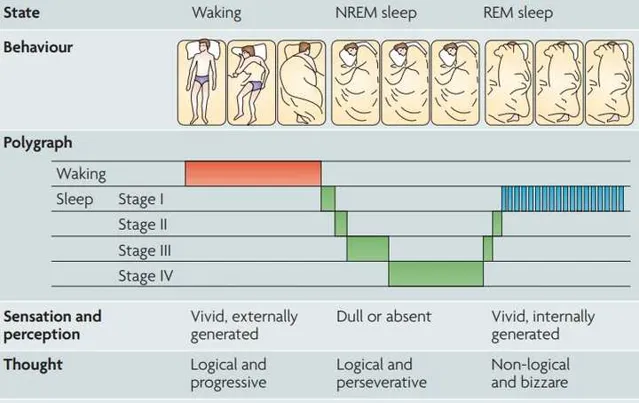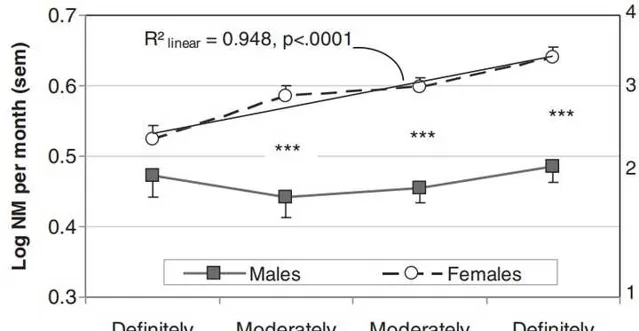噩夢通常出現在睡眠的快速眼動階段(Rapid Eye Movement, REM) [1] , 這一時期,睡眠深度並不是特別深,大腦的邏輯功能被抑制,當夢境感覺特別真實,夢的內容比較極端,人就容易被驚醒,從而回憶為「噩夢」。所以,「噩夢」這個概念是後驗的,做噩夢多的人,做其他緩和性內容的夢的頻次也更高,只不過這些夢不會讓人驚醒,也就更少形成回憶。

也就是說,噩夢多僅僅是一種片面感受,真實情況是做夢(Vividly Dreams)多 [2] [3] . 也就暗示了一種潛在的異常狀態風險,即睡眠障礙(Sleep Disorder) [4] . 而熬夜,本身就是一個睡眠障礙風險因素 [5] ——洲際航班、倒班之後,睡眠質素明顯變差,做夢更多,睡醒之後更可能仍然困倦,感覺精力不足 [6] . 另外,噩夢常常跟壓力感、恐懼感、焦慮感有關 [7] [8] ,當經常熬夜時,身體的免疫能力減弱,機能受到潛在損害 [9] ,壓力感也會因此增加 [10] . 因此,懷疑經常熬夜的人更容易走噩夢是完全合理的。
但具體地,熬夜與噩夢頻次直接還存在一定的性別差異 [11] :熬夜對噩夢的因果性在女性中表現顯著,但咱男性中表現不顯著:

另外,在年齡上也表現出一定的差異:對於成人來說,熬夜對噩夢頻次的提升表現更明顯,而對於兒童來說不明顯:

所以,準確地說,經常熬夜/晚睡的成年女性更容易做噩夢。
參考
- ^ Ross, R. J., Ball, W. A., Dinges, D. F., Kribbs, N. B., Morrison, A. R., Silver, S. M., & Mulvaney, F. D. (1994). Rapid eye movement sleep disturbance in posttraumatic stress disorder. Biological psychiatry, 35(3), 195-202.
- ^ Crick, F., & Mitchison, G. (1983). The function of dream sleep. Nature, 304(5922), 111-114.
- ^ Hobson, J. A. (2009). REM sleep and dreaming: towards a theory of protoconsciousness. Nature Reviews Neuroscience, 10(11), 803-813.
- ^ Schredl, M. (2009). Dreams in patients with sleep disorders. Sleep medicine reviews, 13(3), 215-221.
- ^ Sack, R. L., Auckley, D., Auger, R. R., Carskadon, M. A., Wright Jr, K. P., Vitiello, M. V., & Zhdanova, I. V. (2007). Circadian rhythm sleep disorders: part I, basic principles, shift work and jet lag disorders. Sleep, 30(11), 1460-1483.
- ^ Soleimany, M., Ziba, F. N., Kermani, A., & Hosseini, F. A. T. E. M. E. H. (2007). Comparison of sleep quality in two groups of nurses with and without rotation work shift hours. Iran Journal of Nursing, 20(49), 29-38.
- ^ American Academy of Sleep Medicine. (2005). International classification of sleep disorders. Diagnostic and coding manual, 51-55.
- ^ Selvi, Y., Aydin, A., Gulec, M., Boysan, M., Besiroglu, L., Ozdemir, P. G., & Kilic, S. (2012). Comparison of dream anxiety and subjective sleep quality between chronotypes. Sleep and Biological Rhythms, 10(1), 14-22.
- ^ Irwin, M., McClintick, J., Costlow, C., Fortner, M., White, J., & Gillin, J. C. (1996). Partial night sleep deprivation reduces natural killer and celhdar immune responses in humans. The FASEB journal, 10(5), 643-653.
- ^ Gopalakrishnan, A., Ji, L. L., & Cirelli, C. (2004). Sleep deprivation and cellular responses to oxidative stress. Sleep, 27(1), 27-35.
- ^ Nielsen, T. (2010). Nightmares associated with the eveningness chronotype. Journal of biological rhythms, 25(1), 53-62.











